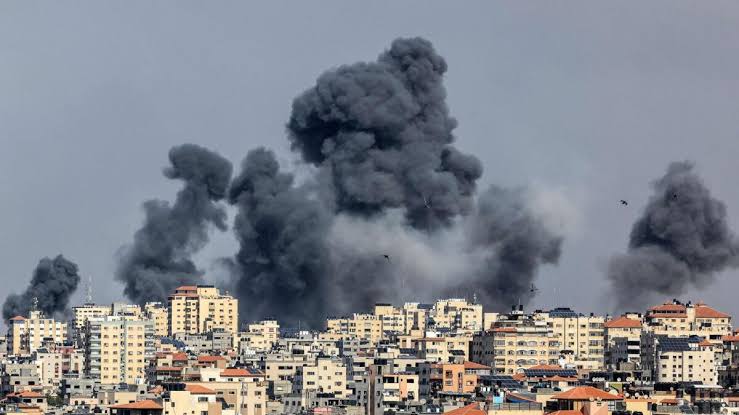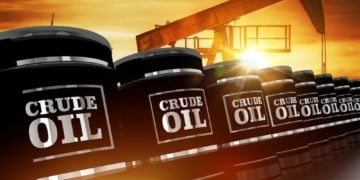Experts and persons with knowledge of regional crises have expressed different opinions with regard to how the ongoing Israel-Palestine conflict might affect Nigeria’s oil and gas sector.
Those who spoke with the LEADERSHIP, however expressed concerns about its possible consequence on importation of Premium Motor Spirit, PMS, also called petrol.
Nigeria relies on importation of its petrol needs as local refineries are not refining products at the moment.
Though oil price reportedly jumped on concerns that the situation in Israel and Gaza could escalate to the extent of disrupting output from the Middle East, the National President of Petroleum Products Retail Outlets Owners Association of Nigeria (PETROAN), Dr Billy Gillis-Harry, ruled out the possibility of the conflict causing additional burden on the nation, apart from crude price hike.
Brent crude, the international benchmark, climbed by $2.25 a barrel to $86.83, while US prices also rose, according to report on Monday.
Israel and Palestinian territories are not oil producers but the Middle Eastern region accounts for almost a third of global supply.
Speaking on this while chatting with LEADERSHIP, Gillis-Harry, said Nigeria imports products and has crude trade majorly with Europe, China and India, and as such even imported refined products come through Atlantic ocean and Mediterranean.
He also, said that both countries in the conflict are not key oil producers nor have direct purchase oil deal with Nigeria.
“What may play out here is that escalation of the crises when extended to key producers will only see a jump in crude oil price.
” What is affecting domestic price of petrol is rising cost of dollar. So as long as the dollar is gaining and rising above the naira then the price of petrol will continue to rise”. he said.
However diesel price is already rising above N1,100 per litre.
The National Bureau of Statistics (NBS), has disclosed that price of Kerosene surged by 57.18 per cent, reaching N1,272.40 per litre in August.
The PETROAN president further expressed fears that as dollar now exchanging for over N1,000 at the parallel there are clear indications that the foreign exchange crisis may worsen which will continue to impact price of petrol.
Reports indicates that petrol trading is close at $1,023.00 per metric tonne at the international market.
The report also notes that with N1,020 per dollar and and as analysts forecasts that crude oil price may hit $100 per barrel, the situation may thus push the difference between the current pump price and the actual price.
Nigeria’s current petrol consumption is about 52 million litres daily.
Although Nigeria had increased its crude oil output by about 110, 000 barrels per day, helping to stabilise the global oil market and pushing the Organisation of Petroleum Exporting Countries (OPEC) output to 27.73 million barrels per day (bpd) in September, analysts are projecting that the ongoing war might disrupt supplies in the Middle East if other countries enter the conflict.
On his part, the chief executive officer, of the Center For The Promotion Of Private Enterprise, CPPE, Dr Muda Yusuf, said the impact may not be anything to worry about because both nations are not oil producing nations.
Yusuf, said that except key producer nations like Saudi Arabia, Qatar among others join the conflict.
He however doubted such reaction as Saudi Arabia do not have mutually beneficial relationship with Iran, presumed to be backing Hamas.
He said however, if the US pushes on with support to Israel it may lead to escalation of terrorism with its consequential impact in overall global economy.
The recent Hamas’s assault on Israel was the biggest escalation between the two sides for decades.
Western nations condemned the attacks while a spokesperson for Hamas, the Palestinian militant group, told the BBC that the group had direct backing for the move from Iran – one of the world’s largest oil producers.
The Wall Street Journal had also reported the same story earlier on Sunday.
Iran denied involvement in the assault at a UN Security Council meeting in New York on Sunday, Reuters reported.
But Iranian President Ebrahim Raisi has expressed support for the attack.
On Monday, Israel ordered US oil giant Chevron to pause production at the Tamar natural gas field off the country’s northern coast
The country’s energy ministry, which has closed the field during previous periods of unrest, said there was enough fuel from other sources to meet Israel’s energy needs.
Israel’s largest offshore gas field, Leviathan, continues to operate as normal, Chevron said.
Energy analyst Saul Kavonic told the BBC that global oil prices have risen “due to the prospect of a wider conflagration that could spread to nearby major oil-producing nations such as Iran and Saudi Arabia”.
On Monday morning, the price of West Texas Intermediate crude, the US benchmark, was up $2.50 a barrel at $85.30.
Caroline Bain, chief commodities economist at Capital Economics, told the BBC’s Today programme that Iran had been increasing oil production over the course of this year despite US sanctions.
Overall, Ms Bain said Capital Economics expected demand for oil to exceed supply in the final three months of the year and “that should support higher prices”.
Mr Kavonic said that about a fifth of global supply would be “held hostage” if passage through the Strait of Hormuz, a vital oil trading route is disrupted.
The Strait of Hormuz is crucial for the main oil exporters in the Gulf region, whose economies are built around oil and gas production.
Uncertainty over how events could develop in the coming days may also drive investments into US Treasury bonds and the dollar, which investors traditionally buy at times of crisis, said James Cheo from HSBC bank.
On Monday, Israel’s central bank said it would sell up to $30bn of foreign currency in a bid to calm markets and support the country’s own currency, the shekel, which has fallen sharply.
Following Russia’s invasion of Ukraine in February 2022, oil prices soared, hitting more than $120 a barrel in June last year.
They fell back to a little above $70 a barrel in May this year, but have steadily risen since then as producers have tried to restrict output to support the market
Saudi Arabia, a major oil producer, said it would make cuts of a million barrels per day in July.
Other members of OPEC+, a group of oil-producing countries, also agreed to continued cuts in production in an attempt to shore up flagging prices.
OPEC+ accounts for around 40 per cent of the world’s crude oil and its decisions can have a major impact on oil prices.





